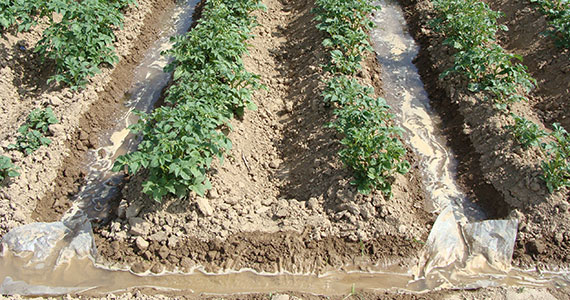
Resource-poor smallholder farmers in Central Asia often struggle to make a profit out of their agricultural activities. On the one hand, they lack skills and technologies to tackle effects of climate change such as water shortages, which are a reality. On the other hand, lack of improved crop varieties suitable for the local conditions makes them even more vulnerable to the vagaries of the weather.
Many smallholder farmers in Uzbekistan and Tajikistan make a living by growing potato, a key food and cash crop in the region. Its traits make it well suited to the needs of local smallholders. Potato yields more food per unit of water than other crops. And its 'nutritional productivity' is especially high: for every cubic meter of water applied in cultivation, potato produces 5,600 calories of dietary energy, compared to 3,860 in maize, 2,300 in wheat, and just 2,000 in rice. Scientists believe that an increase in the proportion of potato in the diet would alleviate pressure on water resources. Potato is also among the crops with the greatest potential for food security and income generation in Central Asia. If stress-tolerant varieties are cultivated and water-saving technologies are used, smallholders can increase potato yields by as much as 40%.
To make this happen, it is important that with the help of researchers farmers learn about improved, robust crop varieties and water-saving technologies. It is also necessary to involve farmers together with researchers in agricultural experimentation to accelerate the development and adoption of innovative technologies. What is good, local scientists show a strong interest in drought-tolerant potato varieties and water-saving technologies. And farmers are increasingly looking for solutions to cultivate potato with reduced water supply, and early potato varieties suited to drought and high temperatures.
Helping local researchers and farmers in this is the goal of the three-year project 'Improved potato varieties and water management technologies to enhance water use efficiency, resilience, cost-effectiveness, and productivity of smallholder farms in stress-prone Central Asian environments', funded by the German development cooperation instrument of BMZ/GIZ. Launched in 2012, the project is aimed at increasing potato productivity and competitiveness, and family income of resource-poor farmers in stress-prone areas of Central Asia, specifically in Uzbekistan and Tajikistan. It is expected that national agricultural research institutions, Farmers' Associations, individual farmers, and policymakers will use and apply participatory research methods to disseminate improved stress-tolerant potato varieties, and cost-effective water management technologies.
Recently, the project team met in Tashkent, Uzbekistan, to discuss progress so far. From 3 to 5 September 2013 about 20 participants gathered at the annual project meeting to look at the results during the first and second years of the project implementation and discuss how to re-adjust protocols for laboratory and field experiments. Representatives from IWMI, University of Hohenheim (Germany), ICARDA, national research partners from Kazakhstan, Kyrgyzstan, Tajikistan and Uzbekistan, as well as CIP's scientists, also discussed the joint preparation of scientific articles based on the results of two-year experiments and formulated recommendations on future needs and actions. At the end of the meeting participants visited the laboratory of cellular technologies at the Institute of Bio-organic Chemistry in Tashkent to see an ongoing experiment on photoperiod/day neutrality. They also toured fields of the Institute of Vegetables, Melon and Potato, and private farms where experiments on water use efficiency, crop performance and varietal trials are under way.
It is expected the project will ultimately benefit farmers in Central Asia by making available new parental genetic materials and tools to breed water-efficient potatoes and develop cost-effective irrigation practices that will cut water consumption and production costs. Farmers will be able to produce more reliable and larger quantities of marketable potatoes, and consumers will enjoy more stable food prices free of the vagaries of international markets that typify staple grains. Researchers, regional authorities, and policymakers will benefit from the availability of more scientific data.